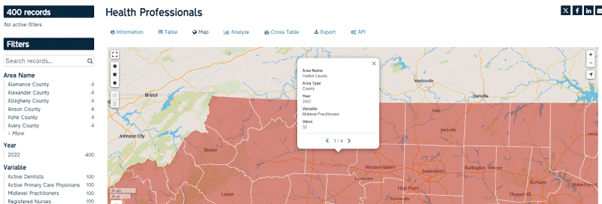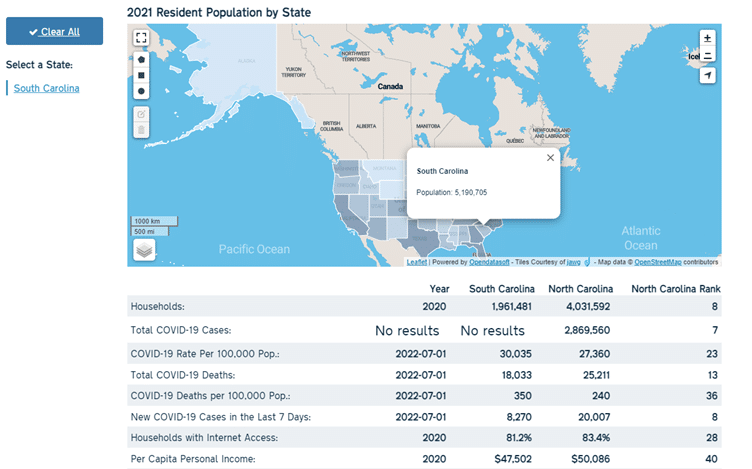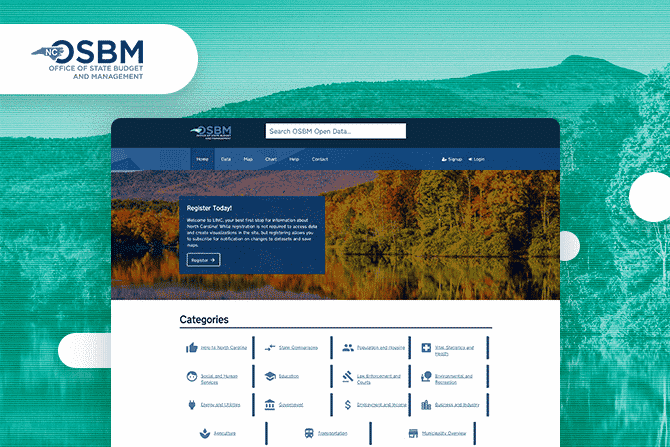The importance of data exchanges to state-level collaboration

State governments cover an enormous range of services and are often complex, diverse organizations. Data sharing helps them become more collaborative, efficient and effective, building trust with stakeholders. How can data exchanges break down silos and enable data sharing and help them meet their key objectives?
Like the wider public sector, state governments are under pressure to increase efficiency, make effective, well-informed decisions, be transparent across their activities, and deliver a seamless experience to taxpayers, businesses and other stakeholders.
However the size and scale of state governments, with multiple departments and large workforces, can make achieving these objectives difficult. Employees are focused on their area and role, while organizational silos make it hard to collaborate between departments.
Data sharing is the answer, something state Chief Data Officers (CDOs) understand. However, given the complexity of state level government, and the sheer volumes of data involved, how can data sharing be implemented effectively?
The challenges to state level data-sharing and collaboration
State governments face five key challenges to sharing data across their wider organization.
Organizational silos
To better serve taxpayers, state government is organized into specific departments, covering everything from health services to transport. Often large organizations in their own right, each of these has its own structure and role, with specialists focused on meeting departmental goals. While this ensures programs are delivered effectively, it can hold back collaboration and data sharing with other departments, municipalities, and the wider world.
A shortage of technical data skills
Data specialists are in short supply generally, with particular skills shortages in the government sector. This means the mechanisms and infrastructure for data sharing may not be fully developed, so information isn’t made available more widely.
Lack of an overarching data culture
Employees and policymakers may not have the skills or understanding to interpret data effectively, particularly if data is only available in raw tabular formats. This lack of a data culture means employees don’t feel confident or comfortable in using information during their daily working lives, even if it could benefit them.
Multiple, incompatible data formats
Different departments rely on different technology solutions, which generate data in a range of formats. These may not be interoperable, holding back data sharing, particularly from legacy solutions. Different departments may also describe data in specific ways that don’t match the terms used by other teams. All of this makes sharing harder at a technical level.
Navigating scale and complexity
It is important to understand the sheer size and complexity of state government. They have tens of thousands of employees spread across different departments and offices, each with their own roles and knowledge. Finding the right information can be like looking for a needle in a haystack, holding back the usage of data, even if it is available in another branch of state government.
How a data exchange enables seamless sharing
Tapping into the potential of data sharing can transform state government in terms of efficiency, decision-making and openness. More and more data is being generated as states digitize their operations, yet it is often trapped in different departments or cannot be easily accessed by those that would benefit from it.
Data exchanges overcome these challenges. They provide all employees with centralized, simple and secure access to all state data assets through an intuitive, e-commerce style self-service interface. Employees can quickly and confidently discover relevant data through AI-powered search while data owners can publish and update data assets so they are available to all.
Clear descriptions and comprehensive metadata build trust and confidence users are accessing the best data for their needs, all while avoiding duplication and harmonizing data formats. Non-experts can explore data through interactive visualizations such as maps or dashboards, helping build understanding and driving the creation of a data culture. Data exchanges therefore strengthen overall state government and increase the ROI from investments in technology and information.
The North Carolina experience
LINC, the data exchange created by the North Carolina Office of State Budget and Management (OSBM) provides the perfect example of the benefits a data exchange can bring. OSBM works collaboratively with agencies and departments across North Carolina to bring together their data and make it easily available to both internal policymakers and the wider community, both inside and outside the state. These include groups as varied as legislators, local government officials and children completing school projects. The LINC data exchange now contains datasets covering areas as diverse as population (including census data), labor force, education and agriculture, supplied by 20 state departments. Data continues to grow, with an ongoing outreach program with state departments and offices to bring their information onto the platform.

The benefits of creating state-level data exchanges
Creating state level data exchanges seamlessly connects everyone with the relevant data they need, without requiring specialist skills or tools. They maximize and scale the value data brings, delivering benefits in seven key areas.
Improved efficiency
State governments rightly want to maximize the impact of their budgets. Centralizing data in exchanges supports this by removing data duplication, streamlining and reducing information management costs, and allowing data to be used to increase productivity.
Closer collaboration
By breaking down silos and sharing data between departments, teams can work together more easily. They can collaborate on wider government objectives, such as around sustainability, and create holistic solutions to problems to meet the changing needs of taxpayers.
Better informed decision-making and policymaking
Accessing relevant, timely data from across state government gives a more complete view of particular areas or challenges. This means operational decisions can be based on better information, making them more likely to be successful. At the same time, by providing policymakers with the full picture, lawmaking is more data-driven and based on facts.
Greater transparency
State governments have to be accountable to those that fund them, whether citizens or businesses. By publishing the information behind particular actions taxpayers can clearly see why policies have been introduced or laws created, based on the data. Sharing data collected from across departments through open data platforms delivers transparency and enables state governments to be held to account.
Enhanced competitiveness
In a competitive world, states need to showcase why they are the best location for business investments, new production facilities, or simply that they are a great place to visit or move to. Combining data from across government and making it available to interested parties through self-service helps attract investment and people to the state. For example, OSBM provides a comparison of North Carolina with other states around multiple key metrics, such as per capita income and company launches, in order to better inform businesses and potential new residents.

Increased consistency and better governance
It can be difficult for state governments to understand their full data estate or to ensure it is described using the same terms across the wider organization. Data exchanges help by harmonizing data from different departments and making it available in consistent, understandable formats, using agreed metadata. This not only drives greater reuse, but also supports robust data governance, enforcing standards and processes on all data, whichever branch of government creates and manages it.
Enabling future innovation
Everyone is talking about the potential of AI to transform efficiency and enable new innovations. However to be effective, AI models need to be trained on relevant, consistent data. Data exchanges can be used to collect and deliver the reliable, high-quality data required for this, providing the foundation for trusted and effective AI models. As well as AI, data exchanges also allow state governments to collaborate with businesses, sharing relevant data to benefit the wider community.
State governments need to continually demonstrate their effectiveness and the value they bring to their taxpayers and other stakeholders. Data sharing is essential to delivering on these needs, improving efficiency, demonstrating transparency and enabling better decision and policymaking. Data exchanges are the foundation for successful data sharing, embedding the use of information within state government at all levels, building a robust data culture and benefiting employees, legislators, and the wider community, now and in the future.
Interested in finding out how you can streamline your data sharing? Book a meeting with our experts to learn more.

How can data sharing help different public sector organizations meet their changing objectives? To demonstrate its power we look at how multiple agencies and municipalities in North Carolina are harnessing data to increase efficiency, transparency and innovation.

US states are increasingly focused on data management and sharing in order to increase efficiency, boost transparency and improve decision-making. Our blog explains the steps they should follow to successfully harness data and democratize data use.

To support informed decision-making and serve the growing needs of North Carolina, the Office of State Budget and Management (OSBM) needed a comprehensive, automated solution that would: House statistical data covering state population (including census data), labor force, education, and agriculture Make data available to users at all levels, from policymakers to citizens Enable users to instantly compare information about North Carolina with other states Increase transparency and citizen engagement around policymaking Learn more about this open data project in this new customer story!
